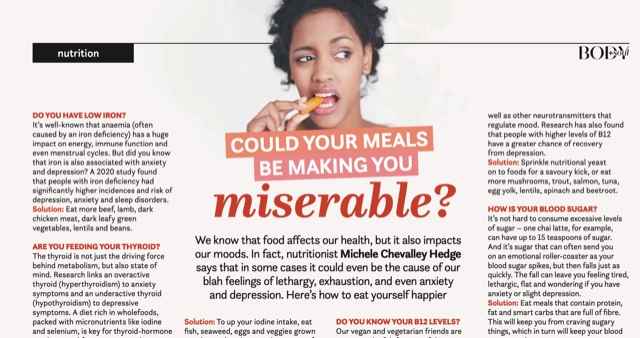Food and mood: Could your meals be making you miserable?

Food and mood: Could your meals be making you miserable?
Nutritionist Michele Chevalley Hedge says that food can be the cause of our blah feelings of lethargy, exhaustion, and even anxiety and depression.
If you’re feeling a little lower than usual, it’s possible your diet could be the culprit.
Nutritionist, Michele Chevalley Hedge shares a few common problems to consider, and how you can solve them.
It’s well-known that anaemia (often caused by an iron deficiency) has a huge impact on energy, immune function and even menstrual cycles.
Do you have low iron?
But did you know that iron is also associated with anxiety and depression?
A 2020 study found that people with iron deficiency had significantly higher incidences and risk of depression, anxiety and sleep disorders.
Solution: Eat more beef, lamb, dark chicken meat, dark leafy green vegetables, lentils and beans.
Are you feeding your thyroid?
The thyroid is not just the driving force behind your metabolism, but also your state of mind.
Research links an overactive thyroid (hyperthyroidism) to anxiety symptoms, and an underactive thyroid (hypothyroidism) to depressive symptoms.
A diet rich in wholefoods, and packed with micronutrients like iodine and selenium, is key for thyroid-hormone synthesis and function. Poor iodine status has been associated with brain damage and an enlarged thyroid gland.
Solution: To up your iodine intake, eat fish, seaweed, eggs and veggies grown in iodine-rich soils. For selenium, opt for brazil nuts, tuna, oysters, pork, beef, prawns and mushrooms.
Do you know your B12 levels?
Our vegan and vegetarian friends are most at risk of deficiency of this nutrient.
Vitamin B12 is important for red blood cell, DNA and serotonin production, as well as other neurotransmitters that regulate mood. Research has also found that people with higher levels of B12 have a greater chance of recovery from depression.
Solution: Sprinkle nutritional yeast on to foods for a savoury kick, or eat more mushrooms, trout, salmon, tuna, egg yolk, lentils, spinach and beetroot.
How is your blood sugar?
It’s not hard to consume excessive levels of sugar – one chai latte, for example, can have up to 15 teaspoons of sugar.
And it’s sugar that can often send you on an emotional roller-coaster as your blood sugar spikes, but then falls just as quickly. The fall can leave you feeling tired, lethargic, flat and wondering if you have anxiety or slight depression.
Solution: Eat meals that contain protein, fat and smart carbs that are full of fibre. This will keep you from craving sugary things, which in turn will keep your blood sugar steady.
Categories
- A Healthy View (507)
- Breakfast Recipes (22)
- Chicken Dinner Recipes (29)
- Chilli Recipes (5)
- Christmas Recipes (14)
- Curry Recipes (8)
- Dessert Recipes (20)
- Dinner Recipes (113)
- Easter Recipes (9)
- Energy & Vitality (4)
- Free Recipes (232)
- Gut Health (11)
- Hormone Health (17)
- Media (86)
- Mental Health (30)
- Mexican Recipes (11)
- Nutrition (205)
- Productivity (5)
- Salad Recipes (9)
- Sauce & Dip Recipes (12)
- Seafood Recipes (12)
- Sleep (7)
- Soup Recipes (12)
- Snack Recipes (56)
- Stress (2)
- Sugar (14)
- Weight Loss (36)
- Workplace Wellbeing (26)
- Brain Health (3)
- energy (1)
- calories (1)
Ready to take the next step?
Explore our full range of wellbeing courses and start your journey today.

Michele Chevalley Hedge is a qualified Nutritional Medicine Practitioner, speaker, and best-selling author has delivered 600+ keynotes for leading global brands, including Microsoft, Accenture, American Express, Apple, ANZ, CBRE, the Australian Government, and more.
Michele’s nutrition retreats, wellness courses, books, articles, and corporate health programs are backed by peer-reviewed research on workplace well-being, nutrition, stress, and mental health. A regular guest on Channel 7, Sunrise, and The Today Show and contributor to The Sydney Morning Herald, Body & Soul, and The Daily Mail, Michele is also an Ambassador for Cure Cancer and the Heart Research Institute.



0 comments
Leave a comment
Please log in or register to post a comment